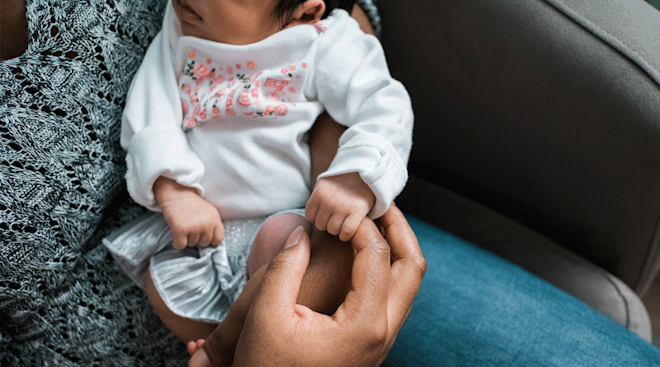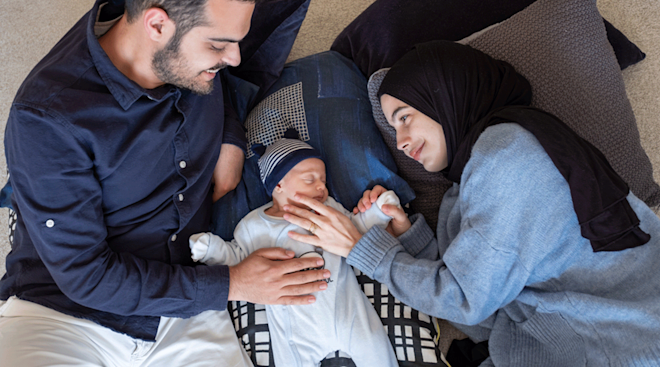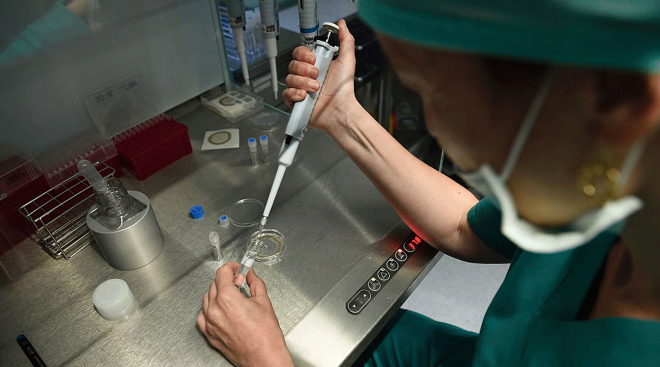Ready to Expand Your Family? a Get-Started Guide for LGBTQ+ People
Making the decision to expand your family is exciting, but it takes a lot of planning and preparation. And for LGBTQ+ couples, there are extra questions to answer and hurdles to jump through. If you’ve made the decision to grow your family, read on for our guide on getting started, including the many paths you can take to parenthood, key things to consider and conversations to have with your partner and loved ones.
There are several paths to parenthood for LGBTQ+ families; some may be better suited to your unique circumstances. To help give you an overview, we enlisted experts to walk you through each option.
Donor sperm or donor eggs
Depending on your specific needs, you may require donor eggs or donor sperm for your fertility journey. Donor sperm can be anonymous or known. Anonymous donor sperm can be purchased through a sperm bank for between $300 to $1,500 per vial, though it’s recommended to purchase multiple vials for the best chance at conception, according to Family Equality, an organization committed to advocating for LGBTQ+ families.
Known donor sperm can be more affordable, especially if the sperm is collected or if insemination occurs at home without medical assistance. Optional testing of known donor sperm for medical and fertility screening can range from $25 to $300. If a known donor or intercourse outside of the relationship is used for conception, it’s important to research the legalities of your familial arrangements (more on this below).
Because the process for harvesting and preserving eggs is more complicated, finding donor eggs is typically included in assisted reproductive technology options like in-vitro fertilization or traditional surrogacy.
Unfortunately, for transgender people who are looking to freeze their eggs or sperm prior to their medical transition, it can be an expensive process, as it’s rarely covered by insurance, per Family Equality. For freezing sperm, the cost can range from $250 to $1,500, with an added $175 to $750 in annual storage fees. For freezing eggs, the costs can be steeper as the procedure is more medically invasive. It ranges from $7,000 to $12,000 with additional annual storage fees.
In-vitro fertilization
Also known as IVF, this process uses assisted reproductive technology (ART) to mix eggs with sperm to create embryos. Those embryos are then placed inside a uterus. In terms of cost, according to the American Society for Reproductive Medicine, each IVF cycle can cost around $12,400. However, Rebecca Minor, MSW, LICSW, a licensed clinical social worker and gender specialist in private practice, estimates that number to be higher—anywhere from $12,000 to $15,000 per cycle, alongside medication costs. Per Family Equality, the costs could be as high as $21,000 or more, depending on whether the eggs were frozen and whether an egg donor is needed.
For partners who both have ovaries, reciprocal IVF is a way both partners can play a biological role in parenthood. In reciprocal IVF, one partner can provide the eggs that will be fertilized with donor sperm, while the other provides the uterus the embryos will be placed inside, Minor explains. While Reciprocal IVF has the same costs for the procedure, the total may be even more, up to $30,000 per cycle, notes Rachel Gerber, MD, a board certified reproductive endocrinologist and infertility specialist at RMA of New York-Westchester. This is because both partners need medication to prepare their bodies, which can add anywhere from $3,000 to $8,000 per cycle, Family Equality notes.
Per Mayo Clinic, the process of starting IVF can be lengthy, as it involves rigorous testing of the eggs and sperm used, as well as in-depth medical questionnaires. Once that initial step is complete, the actual IVF cycle itself can take around three weeks, give or take. But bear in mind that each cycle can be emotionally and physically taxing—and it may take multiple cycles before you and your partner become pregnant.
Intrauterine Insemination
Intrauterine insemination (IUI) is a process in which sperm is placed directly into the uterus (with the help of a catheter) around the time of ovulation. According to Minor, this option is slightly less expensive and time consuming, as it can range from $300 to $1000 and take one to two weeks per cycle. Many couples try this method first before opting for IVF. Ultimately, how long it takes to conceive with IUI or even IVF will vary depending on your individual fertility and circumstances, Gerber notes, but it could take anywhere from 3 to 12 months or even longer.
Surrogacy
Surrogacy is a fertility option in which a surrogate with a uterus “carries the pregnancy for the intended parent,” Minor explains. There are different types of surrogacies, including gestational surrogacy and traditional surrogacy. In gestational surrogacy, the individual carrying baby is not also the egg donor, explains Family Equality. In a traditional surrogacy, the individual carrying the child is also the egg donor. For gestational surrogacy, costs can range from $60,000 to $150,000 or more, depending on any prenatal, birth or postpartum complications, the org says. Depending on your state, gestational surrogacy may not be an option. For a traditional surrogacy, the costs are highly variable, as it depends on the method of conception, medical costs and legal fees for establishing parentage. That said, usually traditional surrogacy is slightly less expensive, as it may not require medical treatments such as IVF.
In either case, couples can choose to find a surrogate themselves with the support of a fertility lawyer or enlist the help of an agency. Keep in mind that the agency route cost can be more expensive but offer better legal protection, according to both Gerber and Minor. Moreover, it can take anywhere from one to two years for couples to match with surrogates and finalize legal proceedings before finally meeting baby.
Adoption
Like surrogacy, adoption can be done through a private agency, public foster care or international adoption, Minor says. Regardless of the method, there can be many steps to complete an adoption, including home studies, legal proceedings and matching with a pregnant person, Gerber says. For private, domestic adoptions, costs can range from $20,000 to $45,000, but for international adoptions it can range up to $70,000, depending on the child’s birth country. (Costs are usually lower for foster care adoption, Minor says—more on this below.) The time frame will also vary, but it could take anywhere from 6 to 18 months for a domestic adoption or up to 3 years (or longer) for an international adoption. It’s important to note that, per Family Equality, international adoptions can be one of the most challenging options legally for LGBTQ+ families.
Foster to adopt
Foster care occurs when children are placed into the care of the Department of Social Services from the care of their biological family, usually due to familial issues or safety concerns. Until those issues are resolved, these children are placed into the care of licensed foster parents. If the kids are unable to reunite with their biological parents, foster parents may move forward with the adoption process if they wish to do so. The process can be complex, and usually involves working with the state’s child welfare organization, Gerber notes. Unlike other methods of adoption, foster care to adopt usually costs less and may even be subsidized by the state, she adds. According to Family Equality, the process can cost anywhere from $0 to $2,600. How long the process takes will vary, but can range anywhere from a few months to a few years.
Before embarking on the parenthood journey, there are some key aspects to consider—and some of these may surprise you. The addition of a child can change your current family dynamics in an entirely new way, and, while the transition is undoubtedly wonderful, it can also be difficult. To make it easier, you’ll want to discuss the below topics as the first step on your fertility journey.
Insurance and financial planning
There’s no sugar-coating it: Raising a child in America is expensive, and the sad reality is that fertility treatments and adoption can make it even more of a financial burden. Unfortunately, health insurance doesn’t always cover any or all fertility treatments, so it’s important to look into what your policy covers under prenatal care, IVF, surrogacy, adoption and other fertility treatments. “Understand the extent of coverage for each partner, especially if both are contributing biologically or legally to the process,” Gerber says.
Because all of the paths to parenthood can vary so widely in cost, it’s a good idea to sit down and have an open conversation about financial planning. “It’s essential to budget for these expenses, as well as ongoing costs for the child’s healthcare, education and daily needs,” Minor says. She also recommends looking at life and disability insurance—no one wants to think of the worst, but both of these may offer you some financial protection. As part of your planning, create a detailed budget with all your current and potential expenses. From there, you can explore what savings and benefits you have and options for what funds you might need, like a loan or grant, Minor adds.
Roles and responsibilities
Children bring an increased amount of house work and responsibility, and it’s a good idea to have a preliminary conversation about how you’ll be managing the increased load in your new roles as parents. “Consider who will be the primary caregiver, how to share responsibilities, and how to support each other’s careers and personal time,” Gerber says. This includes discussing small tasks like nighttime feeds, diaper changes and washing laundry to bigger ticket items like planning for parental leave and creating a return-to-work plan. If it’s financially feasible, it may be worthwhile to consider hiring help until you’re more comfortable in your routines, Gerber adds. While these can be difficult conversations, communication at the start of and throughout this journey can help decrease the risk of any resentment and frustration building later on. “Both parents should understand and agree on how they will share parenting duties,” Minor says.
Support network and community
It truly does take a community to raise a child. You’ll want to have a network with family and friends who support your family structure and your journey to parenthood, Gerber says. Other LGBTQ+ families with experience going through the process can be a valuable resource for advice and support. “Utilizing resources from LGBTQ+ organizations can [also] provide invaluable support,” Minor says. This includes finding local and online LGBTQ+ parenting groups, as well as inclusive childcare, daycares and school systems.
But along with helping to navigate logistics, this community can be a shoulder to lean on during the harder days. The truth is that the journey to meeting your child can be a roller coaster of emotions that can be hard on your mental health. It’s important to prepare mentally and emotionally, just as you are financially and legally. “Emotional support from partners, family and community can make a significant difference in this journey,” Minor notes.
Both Minor and Gerber also recommend looking into counseling as a tool to help you navigate this new chapter in a healthy, loving and supportive way. “Be prepared for the emotional highs and lows…[and] discuss potential challenges openly with your partner,” Gerber says.
Legalities
“Whatever path they choose, there are special considerations for LGBTQ+ couples in family formation matters from a legal perspective,” says Alexis L. Cirel, a family and fertility lawyer and founding partner of the Fertility Law Group of Warshaw Burstein LLP in New York City. Not only do pathways like adoption, using a donor and surrogacy need to follow local and state laws, but they also require legal protection recognizing the parent-child relationship for LGBTQ+ families. “A common misconception is that having both parents’ names on a child’s birth certificate sufficiently secures parentage rights for LGBTQ+ couples—it does not,” she explains. “While birth certificates certainly convey some privileges, they’re administrative in nature and don’t carry the same weight as a legal declaration of parentage, and therefore should not be relied upon exclusively.”
Her recommendation for LGBTQ+ couples looking to conceive through assisted reproductive technology (IVF, IUI, etc.) is to seek a court order or other judicial documentation that makes your legal rights as the child’s parents ironclad. “Many jurisdictions in the United States have established statutory regimes and precedential authority designed to ensure equal treatment of LGBTQ+ families in the context of these parentage proceedings,” Cirel says. “However, some states lag woefully behind leaving gaps in protective legislation nationwide.”
Another consideration is legal protections for each parent, regardless of the couple’s marital status or genetic relation to the child. Some families may opt for second-parent adoption to protect against this. “This legal process allows a non-biological parent to adopt their partner’s biological or adopted child, ensuring they have the same legal rights and responsibilities as the biological parent,” Minor explains. “Without this, the non-biological parent may not have legal recognition, which can create significant issues in situations like medical emergencies, school enrollments or in the event of the biological parent’s death.” It’s important to note, however, that second-parent adoption is yet another process, which involves background checks, home visits, court approvals and additional legal and court costs ranging between $2,000 to $5,000, Minor adds.
“For all of these reasons, it’s important for [LGBTQ+] intended parents to consult with an attorney or attorneys with knowledge of ART parentage and/or adoption laws in the state that will govern their family’s arrangement,” Cirel says.
Inclusive care providers
The importance of a provider who makes you feel seen and heard can’t be stressed enough—and both those things are particularly important for LGBTQ+ families, as advocacy is a big part of the fertility journey. Ensure your “healthcare providers and agencies are culturally competent and supportive of LGBTQ+ families,” Minor says. For individuals who are transgender or non-binary who choose to carry a child, it’s important to choose a care team experienced in transgender health. “They can offer guidance on safely pausing hormone therapy and provide prenatal care that respects gender identity,” she adds.
Once you’ve considered all of the above, the best way to move forward is with “thorough research and planning,” Minor says. “Gather information about each path to understand the requirements, costs and processes involved.” You’ll also want to consult with professionals like fertility specialists, adoption agencies and legal experts to get an accurate assessment of what your options look like. Once you know the best path forward for you, embrace all that’s to come and remember to remain flexible and patient. As any parent will tell you, “the journey to parenthood can be unpredictable and require adjustments along the way,” Minor says.
Please note: The Bump and the materials and information it contains are not intended to, and do not constitute, legal, financial or medical advice and should not be used as such. You should always consult with your professional advisors about your specific circumstances.
Please note: The Bump and the materials and information it contains are not intended to, and do not constitute, medical or other health advice or diagnosis and should not be used as such. You should always consult with a qualified physician or health professional about your specific circumstances.
Plus, more from The Bump:
Alexis L. Cirel, is a family and fertility lawyer and founding partner of the Fertility Law Group of Warshaw Burstein LLP in New York City. She helped pass the Child-Parent Security Act, legalizing gestational surrogacy in New York and ensuring protections for New York families who used assisted reproduction.
Rebecca Minor, MSW, LICSW, is a licensed clinical social worker, queer gender specialist in private practice and author of the forthcoming book Raising Trans Youth: What To Expect When You Weren’t Expecting This. Additionally, she serves as part-time faculty at Boston University’s School of Social Work. She earned her bachelor’s degree in clinical psychology from Muhlenberg College and her master’s degree in clinical social work from Boston University.
Rachel Gerber, MD, is a board certified reproductive endocrinologist and infertility specialist at RMA of New York-Westchester. She earned her medical degree from the Icahn School of Medicine at Mount Sinai and completed her residency at NewYork-Presbyterian Weill Cornell Medical Center.
Family Equality, Building LGBTQ+ Families: The Price of Parenthood
Mayo Clinic, In vitro fertilization, September 2023
Reproductive Biology and Endocrinology, Impact of in vitro fertilization state mandates for third party insurance coverage in the United States: a review and critical assessment, August 2022
Learn how we ensure the accuracy of our content through our editorial and medical review process.
Navigate forward to interact with the calendar and select a date. Press the question mark key to get the keyboard shortcuts for changing dates.





















































